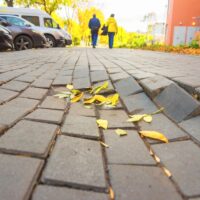Who’s Liable for a Slip and Fall On NY Sidewalks?

Slip and fall accidents can happen anywhere. In the home, in an apartment building, in the office, in a department store, or out on the street. When you slip, trip, and fall on someone else’s property, if you slipped because of a hazard that the property owner either created or should have known about and remedied, the property owner is liable for your injuries. When you slip in a grocery store, liability is easier to determine; if there’s a hazard the store should have fixed, it’s their fault. When you slip and fall on a public sidewalk, however, who is liable? What if you tripped or slipped over a hazard that clearly could have, and should have, been fixed? Is there anyone you can hold accountable, or are you stuck footing your medical bills and other damages on your own?
Different Rules for Different Cities
There are generally two parties that might be liable for a slip-and-fall caused by a notable hazard: The property owner adjacent to the sidewalk, and the city. Different cities have different rules about when the city or the property owner will be liable for an accident that occurs on the sidewalk.
New York City, for example, has shifted much of the responsibility for sidewalk upkeep and maintenance to property owners. The City of New York will only let itself be held liable for a sidewalk slip-and-fall if the following elements apply:
- The area is not maintained up to the city’s standards
- The accident happened on public property or in a public area
- The area is not currently clearly marked as under construction for repairs
- The property adjoins a one, two, or three-family home occupied by the property owner for residential purposes
If any of the four elements above do not apply, then either no party will be held liable, or the commercial entity that owns or operates the abutting property will be the proper party to sue. The business has a responsibility to maintain the section of the sidewalk abutting its property in a “reasonably safe condition.” If the business knew or should have known about the sidewalk hazard and failed to take action to make the sidewalk safe (or warn against the danger), then the property owner can be held liable. Moreover, even if those elements do apply, New York City will typically only be held liable by a court if the City had prior written notice of the sidewalk defect. Special rules also apply for claiming injury against the City, including that they must be notified of the injury very soon after it happened.
Cities in the Hudson Valley have their own rules regarding when the city may be liable vs. when the abutting property owner will be liable. In Kingston, Newburgh, Poughkeepsie, and Ellenville, and most other cities outside of New York City, the city will only be held liable for a slip and fall or other sidewalk injury if the city had prior written notice of the defect and failed to take steps to correct the problem. A wet sidewalk is not the city’s responsibility the way that a wet floor is the responsibility of a grocery store.
However, depending upon the rules specific to your city, the property owner who owns the property abutting the sidewalk might still be held liable. Talk to a seasoned Hudson Valley premises liability attorney to find out who may be liable for your sidewalk slip and fall.
If you or someone you love has been hurt in a New York slip and fall accident or other injury, find out if you have a right to compensation for your injuries by contacting the seasoned and effective Hudson Valley personal injury lawyers at Rusk, Wadlin, Heppner & Martuscello, LLP for a free consultation at 845-331-4100 (Kingston) or 845-236-4411 (Marlboro).
